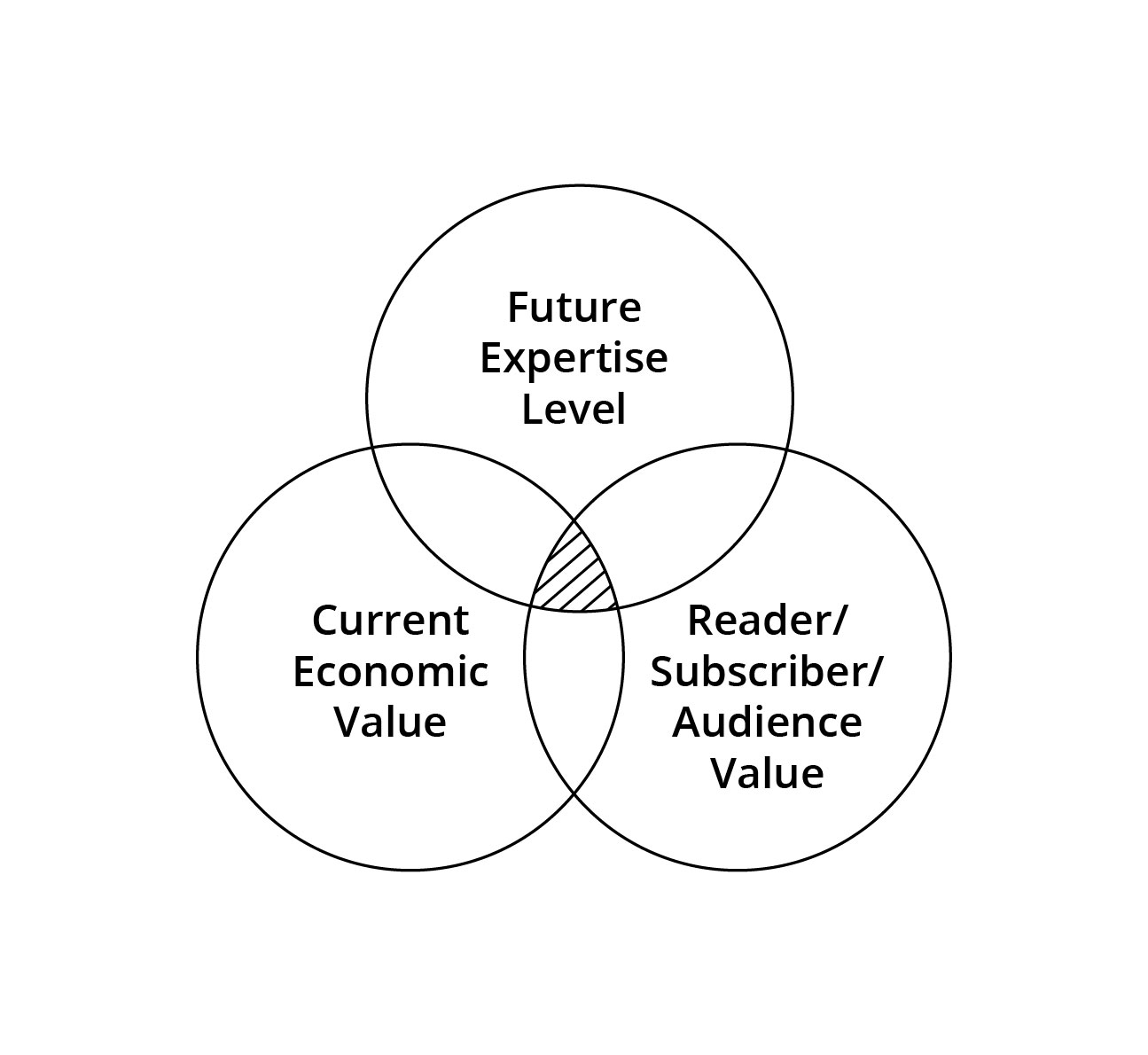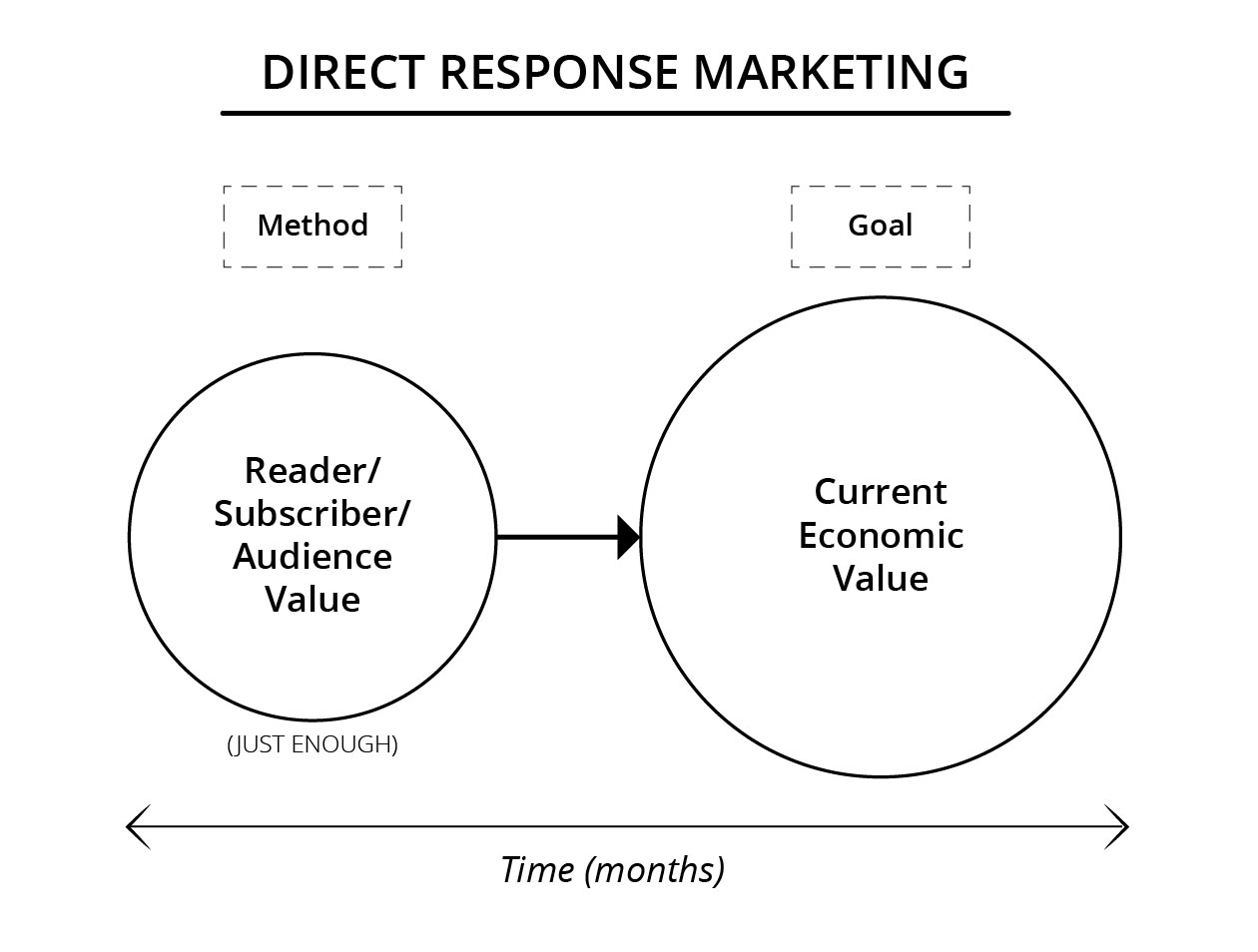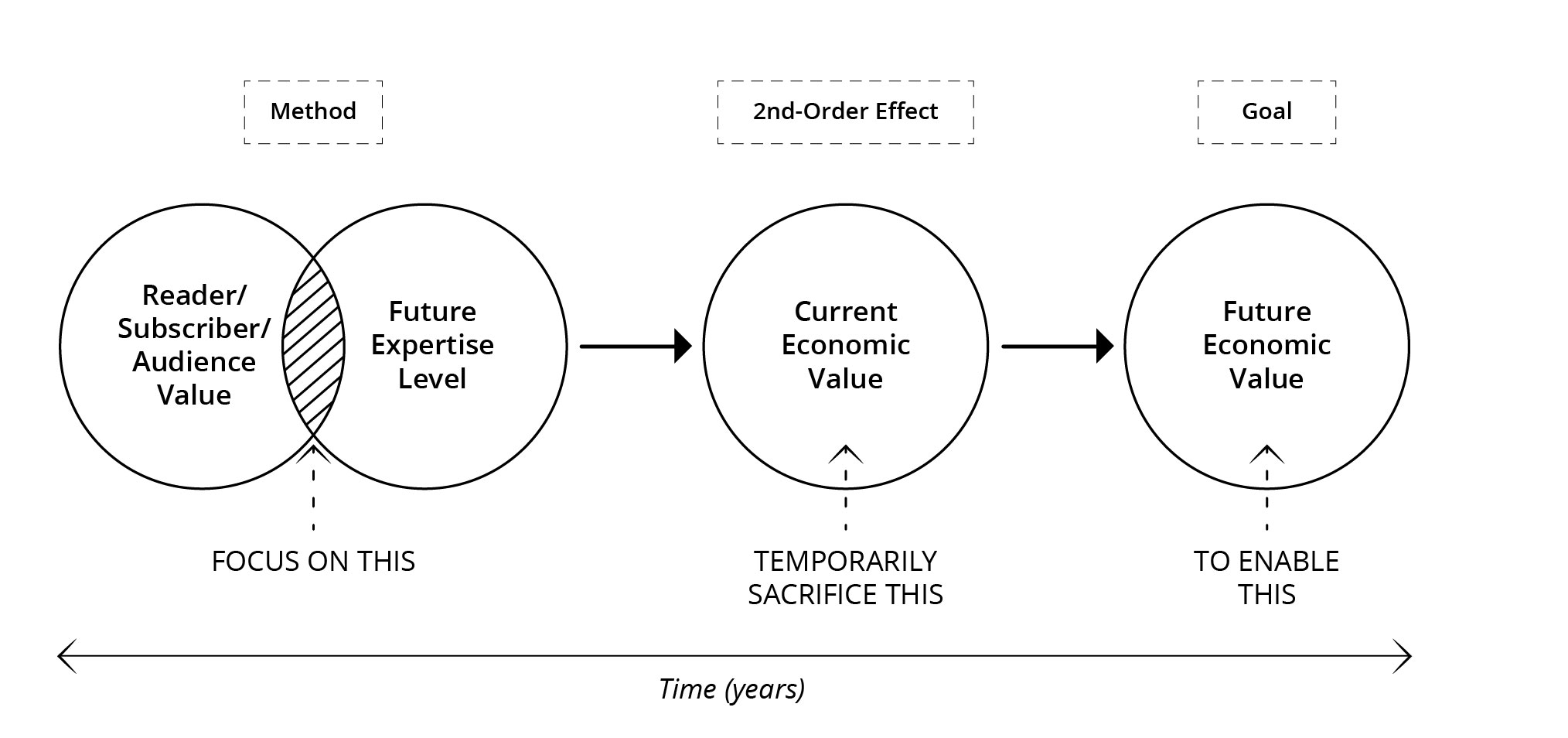Chapter 16: Sucking at Visibility and Trust-Earning Is a Huge Opportunity
Even after your specialize, you'll suck at earning visibility and trust for your services at first. That's because you're new to it. Your inexperience won't be fatal, but you won’t be as good at marketing.
Specialized experts who have been doing it for a while make it look easy, creating all sorts of emotional challenges when you're starting out on a road they're well-traveled on. You compare your work to theirs and blame yourself rather than recognizing what is a natural and unavoidable learning curve.
Additionally, there's lots of bad or ill-fitting advice out there. So as you attempt to DIY your marketing, you'll try to bridge that expertise gap with advice that may not be a good fit for your context. For example, marketing that works well to sell commodities requiring little trust to purchase and little customization to use is not going to fit the context of consulting, which has completely opposite needs.
If you decide to hire a marketing firm, they will go for quick, measurable wins. Alternately, they will probably fail to grasp and communicate your expertise or the nuances that differentiate you from competitors. If they get those quick, measurable wins, they will come at the cost of tarnishing your brand, cheapening your expertise, or making you look needy.
So your choice is to suffer these forms of waste or repurpose that time, energy, and money and pursue a different approach to visibility and trust-earning.
You Have a Beautiful Opportunity
When you do anything that looks like good marketing, you are actually balancing three forms of value creation.

Current Economic Value : Your marketing can create short-term economic value for your business. In other words, it can help you sell your services.
Audience Value : Your marketing can create value of some kind for those it reaches. That value can range from entertainment to inspiration to information and beyond.
Future Value : Your marketing can create longer-term value for your business. The main problem with marketing in general is marketers who become distracted by a desire to create current economic value while neglecting future value creation. The best marketing focuses on future value creation in a way that also creates current economic value as a second-order consequence of the future value creation.
The very worst professional services marketing strives for efficiency over the short-term. You can maximize marketing efficiency by figuring out how to create just barely enough audience value to get a marketing message or call to action in front of the audience you hope to reach. Because the creation of audience value is the cost that's used to calculate the efficiency of the marketing, minimizing that cost is the usual lever that's pulled to increase efficiency/ROI.
Marketers who figure out how to create efficient, repeatable marketing tend to share their approach through blog articles, podcast interviews, etc., and this creates the idea that these approaches are best practice. They might be, if you share the goal of efficiency-at-any-cost marketing, but they won't be for long because others will copy these approaches and oversaturate the market with these copycat approaches, reducing their already borderline ability to produce audience value.

The missed opportunity with the short-term economic value-focused approach is to create long-term brand or expertise value while also creating short-term economic value as a second-order consequence. Shifting the focus to long-term value creation and trusting that this will also create short-term economic value is the opportunity that you, the person new to "doing marketing" has squarely in front of you. Here's what pursuing that opportunity looks like.

A Proposed Framework
Here's a framework that will help you take advantage of the "you suck at marketing" opportunity:
-
Publish short articles to an email list. Write and publish one article every day you work, for at least three months. If at all possible, do this writing first thing when you begin work, before you do anything at all for your clients.
-
Use the publishing in step #1 of this framework to identify an area where both you and your clients lack clarity on an important question or issue. This will generally emerge from the publishing work somewhat naturally, though it may take longer than three months. Design and execute a micro-scale research effort to answer this question, or reduce the lack of clarity around it.
-
Self-publish the results of #2 to your audience.
That's it. You can think of this as an apprenticeship in service of your future value as an expert. You can think of it as a way to get dramatically better at marketing.
This framework puts future value at the center of everything. Rather than using publishing to sell your services, it uses publishing to cultivate your expertise and the future economic value that expertise can generate. How you do this is simple: you write and publish (to an email list) short daily articles about the intersection between what is interesting to you and what is important to your audience.
These articles can be extremely short. They can be incomplete, lacking whatever structure college professors brainwashed you into thinking is ideal. They should be daring, exploring your thinking and the edges thereof through writing.
Doing this for at least 90 days is a transformative journey. At first, you'll "feel the burn" as you struggle to keep up the daily publishing cadence. After maybe a month or so, you'll build up the needed "writing muscle" and publishing daily won't be so daunting.
Then, you'll enter the "expertise enema" phase, where you write about the topics you know the best. You are actually flushing out of your system the expertise that a future version of you will see as trivial or obvious. But you're not there yet, and this is the best you've currently got, so that's what you write about.
As the expertise enema comes to its natural conclusion, you will "hit the wall." You'll feel that you've said everything you have to say about the intersection between what is interesting to you and what is important to your audience. This moment is so incredibly important to your development as an expert, and it is very difficult emotionally. You'll face imposter syndrome and a crushing sense of discouragement at the same time. If you can push through "the wall"—keep publishing even though you are convinced that what you are writing about is complete crap—you will have developed an incredibly valuable skill; exploring important high-uncertainty domains with a consistent and persistent approach. Most schooling rewards superficial exploration of low-uncertainty domains with an inconsistent, sprint-based approach. The world has an abundant supply of this, but it needs more people who can approach high-uncertainty domains with a calm, disciplined, relentless approach. Pushing through the wall in your daily publishing practice will cultivate this skill.
After enough daily publishing, you will discover some questions that no amount of additional publishing can resolve because they are not questions that are answered by refining your thinking. They are questions that need data .
The Value of Data
The culture we live in has a slavish devotion to the idea of data. The idea of data partially frees us from the anxiety of making high-stakes decisions (or decisions that we imagine have high stakes). The idea of data promises to make a huge and overwhelmingly complex world into something comprehensible. The idea of data helps us feel powerful.
The reality is that data is one tool among many that can accomplish what we seek. If uncertainty reduction is the goal, trial-and-error, mentorship, or even dumb luck can get us from a high to a relatively lower degree of uncertainty about something. If anxiety reduction is the goal, then learning, meditation, or medication can get us at least part of the way there.
But again, our culture worships data, and so learning to use data in service of your clients is worthwhile. The latter two parts of The Expertise Incubator framework focus on small-scale data collection.
The first and most important thing here is mindset: you are using data to help your clients make better decisions . That desire must guide your work.
The second most important thing here is scope: the question you seek to answer must be tiny . If you get too ambitious with the scope of your research question, it will overwhelm you with complexity or scale or both and lead to discouragement or failure. Pursuing the answer to a tiny question won't feel like an impressive task, but finding a defensible answer to a tiny question that nobody in your industry has a good answer to will revolutionize your business because it will lead to bigger and better versions of this kind of research.
Note
44: Guillaume is also used as an example in Chapter 13.
45: If the idea of strategic storytelling is new to you, the talk "How great leaders inspire action" by Simon Sinek is a reasonably good introduction to the broader idea of using storytelling or a narrative to increase employee alignment and gain traction in the market.
Here's an example. Guillaume makes a good living helping start-ups use strategic storytelling to increase employee alignment and gain traction in the market. [44] As he was writing and publishing about this topic three times per week to his email list, he began to ask himself forbidden questions: Does strategic storytelling even work? Does it produce a return on investment? Does it live up to the claims made about its impact? [45]
These are forbidden questions because most consultants who offer services connected to strategic storytelling aren't interested in uncovering what would become in inconvenient truth if they discovered there's no robust evidence that their work produces ROI. And there are enough prospects out there who are willing to speculatively invest in strategic storytelling consulting in the hopes that it will do something good for their business. Lots of folks in this market are happy to, to paraphrase Nigel Tufnel, leave this mystery unsolved.
Guillaume was willing to ask the questions because the answer would serve his clients, and he's okay with pivoting elsewhere if he discovers there's no robust evidence of ROI for his chosen methodology. His research process begins like this:
-
Reduce the scope of the question from "Does strategic storytelling product ROI?" to something much, much smaller.
-
Conduct a literature review to further inform and refine the question in #1, avoid a duplicative research effort, and learn from the methodologies that may have been used before.
3 a. If the literature review was sufficiently informative, Guillaume's first research product might be some analysis of what he found during the literature review.
3 b. The literature review might not answer the question Guillaume has, so he might move on to the next step—designing and executing primary research.
As you move into doing primary research, there are several additional ideas that are critical:
Note
46: Credit to Douglas Hubbard for popularizing this idea.
-
Your goal is not certainty; your goal is the reduction of uncertainty . [46] You may never get a complete, irrefutable answer to your question, but you can get useful data that assists with your clients' decision-making.
-
Small data sets can be useful . You are not trying to determine the efficacy of a vaccine, design a nuclear reactor, or advise a government on public policy, so you do not need the levels of scientific rigor associated with those projects. This is not an invitation to be intentionally sloppy, but an invitation to gather, analyze, and use data to serve your clients without unreasonable encumbrances.
At this point, this Expertise Incubator framework idea is either intriguing to you or too far out there to consider. Either outcome is fine, but if you find the idea intriguing, I have published a series of 18 videos on YouTube exploring it further. Search for "TEI Talks" on youtube.com and you should be able to easily find them.
Get Where You’re Going by Walking Cowpaths
It is said that Boston's streets were once meandering cowpaths that developed over time into roads. This isn't actually true, but the idea of wandering around the intersection between what is interesting to you and what is important to your audience is a powerful one.
If you've specialized, you do not need a "content marketing plan." Instead, you need to publish a lot in a medium that facilitates conversations. An email list is ideal for this. Beyond that, you only need to explore what is both interesting to you and important to your audience. The mechanics of publishing daily will do the rest.
You will wander around what feel like cowpaths. This process is, in the short-term, wasteful, but only in the way that actors rehearsing their lines is wasteful. When the "cameras are rolling," you hit your lines almost effortlessly because of this cowpathing.
The practice of frequent publishing makes you frighteningly good at using high-impact marketing (speaking, podcast guesting, etc.) in a powerful, fluent way. If you follow this advice, you'll spend a year or two preparing to do marketing in a way that is far less likely to tarnish your brand or diminish your expertise. After this, you can effectively hire help or DIY it in a much more effective way.
Remember, the opportunity of being bad at marketing is to not do conventional marketing at all and instead repurpose marketing tools to develop valuable expertise that few others are willing to work hard to develop .
Info
- An LLM-generated summary of this book can be found here: LLM-Generated Summary Of TPMfIC
- If you'd like to chat with this book as an OpenAI GPT: https://chat.openai.com/g/g-Ct18XsNSI-indie-consultant-specialization-gpt
- If you would prefer to read this book in Amazon's Kindle ecosystem, or in print: https://a.co/d/aQztpSK
- If you would prefer a DRM-free EPUB copy of this book: https://philipmorgan.lemonsqueezy.com/checkout/buy/06f1179b-3e4a-4e63-a4ee-08c9f166fc34
- If you want to join my email list: https://opportunitylabs.beehiiv.com//)